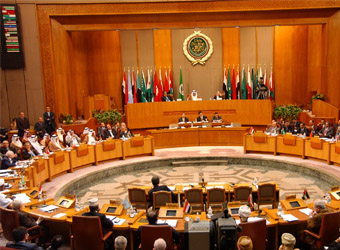The Arab League urged the world to punish the Syrian regime for its alleged use of chemical weapons, but failed to endorse any military action without the blessing of the UN, a setback for US President Barack Obama and his attempt to garner domestic and international support for an attack.
At a hastily convened meeting at the 22-member organisation’s Cairo headquarters late Sunday, Arab League foreign ministers endorsed a statement alleging blame for the August 21 chemical weapons attack in eastern Damascus on Syrian President Bashar al-Assad and calling for “deterrent” action against his regime, describing those responsible for the atrocity as “war criminals”.
“The United Nations and the international community are called upon to assume their responsibilities in line with the UN charter and international law by taking the necessary deterrent measures,” the ministers said in a statement following the meeting.
Efforts by Saudi Arabia and Syrian opposition leaders to convince the organisation to back a US military strike failed. Egypt, Iraq, Lebanon, Tunisia and Algeria voiced opposition to foreign military intervention.
Mr Obama had hoped the organisation would endorse language that could back a military operation without the approval of the UN Security Council. But the Arab world remains starkly divided on Syria and hostile to further US-led wars in the region despite widespread public sympathy for Mr Assad’s opponents.
The ambivalent Arab League statement came as opponents of Mr Assad expressed fear of further violence from an emboldened regime after Mr Obama said he would seek congressional approval for military action against Damascus.
“I think the regime will be stronger after this speech because it was a weak speech. And killing will continue and nothing will change here,” said a medical worker in the Ghouta region to the east of Damascus where the alleged chemical weapons attack took place last month.
While rebels did not expect the west to deliver a crippling blow to Mr Assad in military strikes that had been expected this weekend they were positioning themselves to take advantage as best they could.
The Syrian National Coalition, the main umbrella group for the largely exiled political opposition, on Sunday urged the US Congress to vote in favour of military action.
“If the free world fails to respond to such an outrageous breach of international norms, dictators around the world will be encouraged in their efforts to follow the example set by Assad,” said a statement issued by the group, which added that any attack should be accompanied by a move to arm the rebel Free Syrian Army.
“The decision has to be taken at the earliest because Assad might take advantage of any extra time to build up his support from Iran and Russia,” said Haitham Maleh, a Syrian jurist and human rights activist now in Cairo.
However, Bassma Kodmani, a longtime opposition activist, suggested that hasty action could leave people more vulnerable to a regime backlash than a more serious engagement undertaken with congressional backing.
“There is a risk to going to Congress, but perceptions in the countries that can intervene matter and the reservations are too high to be ignored,” she said. “I prefer to see governments backed by their public opinion to conduct whatever is needed. If we’re going to have a symbolic one-time strike that makes no difference, Assad might emerge reinforced. It may well require a second wave of strikes. Governments need to be confident that what they’re doing is perceived as legitimate.”
The Assad regime has trumpeted Mr Obama’s decision as a sign of weakness. Faisal Mekdad, Syria’s deputy foreign minister, said on Sunday that the US president had stepped back from his threat because his administration lacked evidence of Syrian government involvement in alleged gas attacks.
“The hesitation and the disappointment is so obvious in the words of President Obama yesterday,” Mr Mekdad told reporters in Damascus. “The confusion was clear as well.”
An editorial in Al-Thawra, the state-run daily newspaper, described it as “the start of the historical American retreat”.
Cartoons have been circulating among regime supporters on social media mocking Mr Obama. One shows the US president in various indecisive postures asking “shall I, shan’t I?” Another depicts him as a tiny figure next to a giant Bashar al-Assad and timidly asking the Syrian president for permission to kick him.
But analysts say that while Mr Obama’s decision gives the regime more time to build its narrative, it does not remove the threat, meaning that the regime is unlikely to undertake any significant moves on the battlefield before Congress votes.
“Fundamentally people will remain in limbo,” said Peter Harling, of International Crisis Group “There will be a lot of ridicule [of the US], but that’s more how people react spontaneously on the street – I don’t think it reflects their fears deep down. ”
“Given the way that Obama was going without getting UN or Arab League approval, there’s a lot of public opposition in the Arab world,” said Rami Khouri, a senior fellow at the Belfer Centre for Science and International Affairs at Harvard University. “A lot of people privately will be very happy to see the Americans knock him out but won’t say so publicly. The feeling is that to use American unilateral military power to remove or punish him is just to replace a small local tyrant with a big global tyrant.”
Source: The Financial Times
